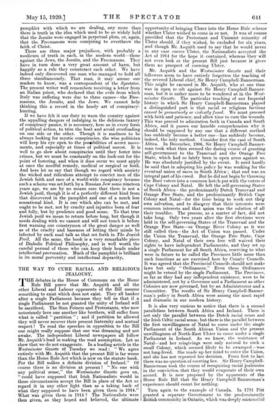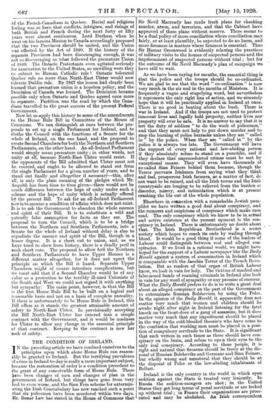THE WAY TO CURE RACIAL AND RELIGIOUS JEALOUSY.
THE debates in the House of Commons on the Home Rule Bill prove that Mr. Asquith and all the other Liberal and Labour opponents of the Bill assume something to exist which does not exist. They all hanker after a single Parliament because they tell us that if a single Parliament be not granted the unity of Ireland will be sacrificed. The Sinn Feiners and Protestants, who now notoriously love one another like brothers, will suffer from what is called " partition " ; and if partition be allowed they will never recover their present fraternity and mutual respect ! To read the speeches in opposition to the Bill one might really suppose that one was dreaming and not awake. The independent Liberal newspapers all follow Mr. Asquith's lead in making the mad assumption. Let us show that we do not exaggerate. In a leading article in the Westminster Gazette of Tuesday we read : "We agree entirely with Mr. Asquith that the present Bill is far worse than the Home Rule Act which is now on the statute book. For the Bill mikes a definite division of Ireland." Of course there is no division at present ! "No one with any political sense," the Westminster Gazette goes on, "could have supposed that Irish Nationalists would in these circumstances accept the Bill in place of the Act or regard it in any other light than as a taking back of what they supposed to have been given them in 1914." What was given them in 1914? The Nationalists were then given, as they hoped and believed, the ultimate opportunity of bringing Ulster into the Home Rule scheme whether Ulster wished to come in or not. It was of course provided that the Protestant and Unionist minority of Ulster should, if they wished, be excluded for six years, and though Mr. Asquith used to say that he would never in any case coerce Ulster, the Nationalists accepted the Act of 1914 for the hope it contained, whereas they will not even look at the present Bill just because it gives them no prospect of coercing Ulster.
Mr. Asquith and the Westminster Gazette and their followers seem to have entirely forgotten the teaching of the revered Liberal chief, Sir Henry Campbell-Bannerman. This might be excused in Mr. Asquith, who at one time was in open re :olt against Sir Henry Campbell-Banner- man, but it is rather more to be wondered at in the West- minster Gazette. The particular teaching of our Imperial history in which Sir Henry Campbell-Bannerman played a distinguished part is that racial or religious factions cannot be prematurely or violently fused. We must proceed with faith and patience, and allow time to cure the wounds. This was proved to admiration both in Canada and South Africa, and it passes our humble comprehension why it should be supposed by any one that a different method has suddenly become a better one—has suddenly become, indeed, the only method. Consider first the case of South Africa. In December, 1906, Sir Henry Campbell-Banner- man took what then seemed the daring course of granting self-government to the Transvaal and the Orange Free State, which had so lately been in open arms against us. He was absolutely justified by the event. It need hardly be said that in adopting his policy he was working for the eventual union of races in South Africa ; that end was an integral part of his creed. But he did not begin by throwing the Boer voters into a common hotch-pot with the voters of Cape Colony and Natal. He left the self-governing States of South Africa—the predominantly Dutch Transvaal and Orange Free State, and the predominantly British Cape Colony and Natal—for the time being to work out their own salvation, and to discgver that their interests were common interests and that union was the solution of all their troubles. The process, as a matter of fact, did not take long. Only two years after the first elections were held in the self-governing States of the Transvaal and the Orange Free State—or Orange River Colony as it was still called then—the Act of Union was passed. Under the Union the Transvaal, the Orange Free State, Cape Colony, and Natal of their own free will waived their rights to have independent Parliaments, and they set up a single Parliament for all South Africa, reserving to what were in future to be called the Provinces little more than such functions as are exercised here by County Councils. It was agreed that the Provincial Councils should not make laws but only "Ordinances." Even these Ordinances might be vetoed by the single Parliament. The Provinces, so far as they had any inaependent existence, were to be administered, not by a Governor and a Parliament as other Colonies are now governed, but by an Administrator and a Committee. The results of Sir Henry Campbell-Banner- man's policy in South Africa were among the most rapid and dramatic in our modern history.
It is also very curious to notice that there is a second parallelism between South Africa and Ireland. There is not only the parallel between the Dutch racial sense and the Irish Celtic racial sense, but there is the parallel between the first unwillingness of Natal to come under the single Parliament of the South African Union and the present unwillingness of North-East Ulster to come under a single Parliament in Ireland. As we know, the resistance of Natal—and her misgivings were only natural to such a small Colony, which seemed likely to be swamped—was not long-lived. She made up her mind to enter the Union, and she has not repented her decision. From first to last there was no question of coercing her. Sir Henry Campbell- Bannerman took the course of recognizing racial jealousies in the conviction that they would evaporate of their own accord. It is now proposed by the opponents of the Home Rule Bill that Sir Henry Campbell-Bannerman's experience should count for nothing.
Turn again to the example of Canada. In 1791 Pitt granted a separate Government to the predominantly British-community in Ontario, which was deeply mistrustful of the French-Canadians in Quebec. Racial and religious feeling was so keen that conflicts, intrigues, and risings of both 'British and French during the next forty or fifty years were almost continuous. Lord Durham when he went on his famous Mission to Canada accordingly proposed that the two Provinces should be united, and the Union was effected by the Act of 1840. If the history of the separate Provinces had been discouraging enough, it was not so discouraging as what followed the premature Union of 1840. The Ontario Protestants even agitated seriously for annexation to the United States, so unwilling were they to submit to Roman Catholic rule ! Ontario tolerated Quebec rule no more than North-East Ulster would now tolerate Dublin rule. By /867 the lesson had clearly been learned that premature union is a hopeless policy, and the Dominion of Canada was formed. The Dominion became possible only when Ontario and Quebec agreed once more to separate. Partition was the road by which the Cana- dians travelled to the great success of the present Federal Government.
Now let us apply this history to some of the amendments to the Home Rule Bill in Committee of the House of Commons. We can distinguish at once between the pro- posals to set up a single Parliament for Ireland, and to clothe the Council with the functions of a Senate for the whole of Ireland, on the one hand, and the proposal to create Second Chambers for both the Northern and Southern Parliaments, on the other hand. An all-Ireland Parliament would simply mean premature unity; in other words, not unity at all, because North-East Ulster would resist. If the opponents of the Bill admitted that Ulster must not be coerced, and ought to be allowed to stand out from the single Parliament for a given number of years, and to stand out finally and altogether if necessary—this, after all, is only the plain meaning of the pledges which Mr. Asquith has from. time to time given—there would not be much difference between the hope of unity under such a scheme and the hope of unity which is actually offered by the present Bill. To ask for an all-Ireland Parliament now is to assume a condition of affairs which does not exist. It is to ask the Government to abandon the whole essence and spirit of their Bill. It is to substitute a wild and patently false assumption for facts as they are. The proposal to turn the Council, which is to be a bridge between the Northern and Southern Parliaments, into a Senate for the whole of Ireland without delay is also to repudiate the essence and spirit of the 13ill7 though in a lesser degree. It is a short cut to union, and, as we have tried to show from history, there is a deadly peril in such short cuts. The proposal to allow both the Northern and Southern Parliaments to have Upper Houses is a different matter altogether, for it does not upset the principle on which the Bill is based. Separate Upper Chambers might of course introduce complications, but we must add that if a Second Chamber would be of any value as a protection to the terribly ill-used Unionists of the South and West we could not regard it with anything but sympathy. The main point, however, is that the Bill is the first Home Rule Bill to be built on a logical and reasonable basis and not on a basis of complete unreality. If there is unfortunately to be Home Rule in Ireland, this Bill offers as it stands the greatest attainable amount of safety to North-East Ulster. In provisionally accepting the Bill North-East Ulster has entered into a simple contract with the Government, and it would be madness for Ulster to allow any change in the essential principle of that contract. Keeping to the contract is now her rock of safety.











































 Previous page
Previous page